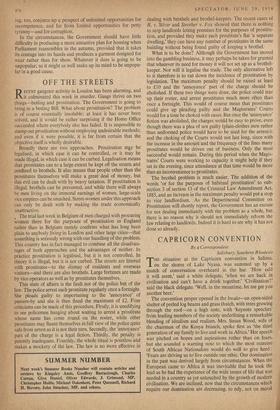OFF THE STREETS
RSCENT gangster activity in London has been alarming, and it culminated this week in murder. Gangs thrive on two things—betting and prostitution. The Government is going to bring in a betting Bill. What about prostitution? The problem is of course essentially insoluble; at least it has never been solved, and it would be rather surprising if the Home Office succeeded where everybody else has failed. It is impossible to stamp out prostitution without employing undesirable methods; and even if it were possible, it is far from certain that the objective itself is wholly desirable.
Broadly there are two approaches. Prostitution rrity be legalised, in which case it can be controlled, or it may be made illegal, in which case it can be curbed. Legalisation means that prostitutes can to a large extent be kept off the streets and confined to brothels. It also means that people other than the prostitutes themselves will make a great' deal of money, but this evil can be dealt with by heavy taxation. If prostitution is illegal, brothels can be prevented, and while there will always he men living on the immoral earnings of women, large-scale vice empires can be smashed. Street-women under this approach can only he dealt with by making the trade economically unattractive.
The trial last week in Belgium of men charged with procuring women there for the purposes of prostitution in England rather than in Belgium merely confirms what has long been plain to anybody living-in London and other large cities—that something is seriously wrong with our handling of the problem.
This country has in fact managed to combine all the disadvan- tages of both approaches and the advantages of neither. In practice prostitution is legalised, but it is not controlled. In theory it is illegal, but it is not curbed. The streets are littered with prostitutes—to the dismay of residents and overseas visitors—and there are also brothels. Large fortunes are made by vice operators as well as by prostitutes themselves.
This state of affairs is the fault not of the police but of the law. The.police arrest each prostitute regularly once a fortnight. She pleads guilty to importuning to the 'annoyance' of passers-by and she is then fined the maximum of £2. Four criticisms can be made of this procedure. Firstly, it is unedifying to see policemen hanging about waiting to arrest a prostitute whose name has come round on the roster,, while other prostitutes may flaunt themselves in full view of the police quite safe from arrest as it is not their turn. Secondly, the 'annoyance' part of the charge is a legal fiction. Thirdly, the penalty is patently inadequate. Fourthly, the whole ritual is pointless and makes a mockery of the law. The law is no more effective in dealing with brothels and brothel-keepers. The recent cases of R. v. Silver and Strother v. Fox showed that there is nothing to stop landlords letting premises for the purposes of prostitu- tion, and provided they make each prostitute's flat 'a separate dwelling.' they can have any number of prostitutes in the same building without being found guilty of keeping a brothel.
What is to be done? Although the Government has moved into the gambling business, it may perhaps be taken for granted that whatever its need for money it will not set up as a brothel- keeper. Nor will it legalise the trade. The only alternative left to it therefore is to cut down the incidence of prostitution by legislation. The maximum penalty should be raised at, least to £10 and the 'annoyance' part of the charge should be abolished. If these two things were done, the police could tear up their roster, and arrest prostitutes much more often than once a fortnight. This would of course mean that prostitutes could give up pleading guilty and the Magistrates' Courts would for a time be choked with cases. But once the 'annoyance' fiction was abolished, the charges wohld be easy to prove, even though there was a plea of not guilty (plain-clothes men rather than uniformed police would have to be used for the arrests): and the choking of the Courts would not last long, since with the increase in the amount and the frequency of the fines many prostitutes would be driven out of business. Only the most successful would remain. During this period when the Magis- trates' Courts were working to capacity it might help if they sat in the evening, since attendance at that time would be more than an inconvenience to prostitutes. The brothel problem is much easier. The addition of the words 'or for the purposes of habitual prostitution' to sub- section 3 of section 13 of the Criminal Law Amendment Act, 1885, and an increase in the maximum penalty would put a stop to vice landlordism. As the Departmental Committee on Prostitution will shortly report, the Government has an excuse for not dealing immediately with the problem as a whole, but there is no reason why it should not immediately reform the law relating to landlords. Indeed it is hard to see why it has not done so already.


































 Previous page
Previous page